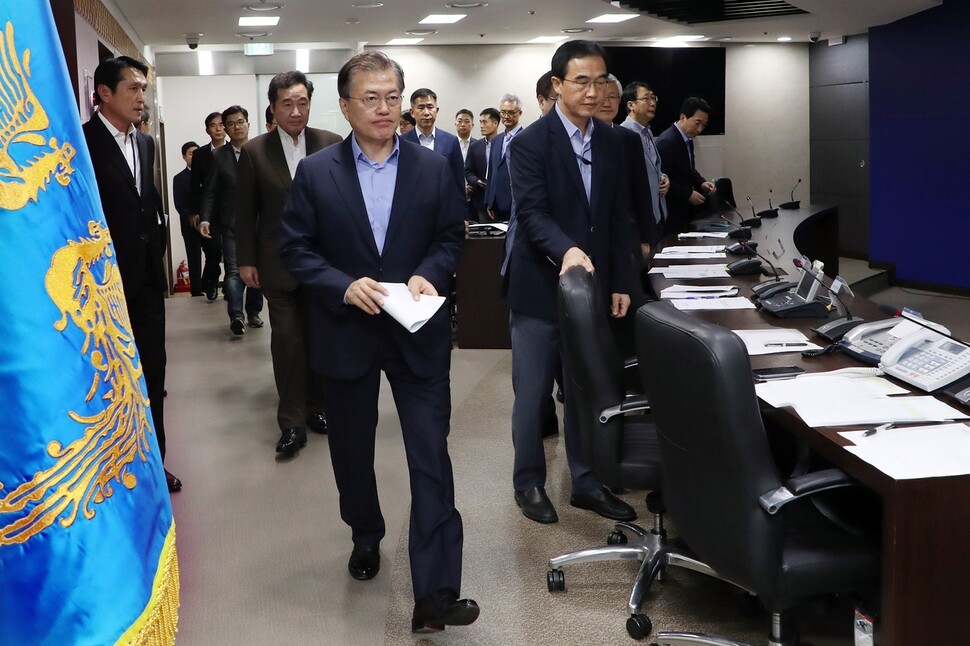hankyoreh
Links to other country sites 다른 나라 사이트 링크
Creative thinking needed to end vicious cycle of provocations

With North Korea abruptly carried out a sixth nuclear test on Sept. 3, the Korean Peninsula is moving toward a precarious crisis. As the vicious circle of provocations and sanctions that has lasted for more than 20 years continues on infinite repeat, North Korea is claiming that its steady pursuit of nuclear weapons and missile capabilities had brought it to the “concluding stage” of its acquisition of a nuclear arsenal. The South Korean government needs to take the lead in finding a solution that can end this vicious cycle, experts say.
Led by South Korea, the US and Japan, the international community was unanimous in denouncing North Korea’s latest nuclear test on Sept. 3. Even China and Russia castigated North Korea for violating UN Security Council resolutions. The UN Security Council will soon convene to discuss placing additional sanctions on the North. The problem is that virtually all the available kinds of sanctions have already been used.
After North Korea test launched multiple ballistic missiles, including the Hwasong-14 ICBM, the UN Security Council unanimously adopted Resolution No. 2371 on Aug. 5, which placed severe limitations on North Korean exports and completely banned exports of North Korean coal. Since less than a month has passed since then, it would not be easy for the UN Security Council to come up with a new sanctions resolutions against the North.
Some are already saying that new sanctions against North Korea are likely to take the form of cutting off its supply of crude oil, something long advocated by the US. But it does not seem likely that China, which supplies more than 90% of North Korea’s crude oil, would agree to this. In addition to concerns that cutting off the crude oil supply would plunge North Korea into chaos, previous UN Security Council resolutions have held that sanctions must not have a negative impact on the lives of the North Korean people.
Considering that North Korea has also been working closely with Russia to diversify its supply of crude oil, China and Russia would have to simultaneously agree to suspend their supplies. While the US and Japan are champing at the bit to impose even stronger sanctions, the widely held view is that the debate over another sanctions resolution will carry on for quite a long time.
In the short term, South Korea and the US are likely to lead a tough military response to North Korea’s provocation. There’s also a good chance that the US military will deploy strategic assets to the Korean Peninsula, a plan that was put on hold during the Ulchi-Freedom Guardian joint military exercises between South Korea and the US that wrapped up at the end of last month. Simultaneously deploying nuclear submarines, an aircraft carrier strike group and strategic bombers including the B1B, B2 and B-52 could maximize the military pressure against the North.
Pyongyang is likely to counter this by carrying out an additional provocation. It has already threatened to carry out an enveloping strike around Guam using the Hwasong-12 intermediate-range ballistic missile. Another provocation at the North’s disposal is launching its Hwasong-14 ICBM at the normal angle, since it has already successfully tested the missile twice at a high angle. If these trends continue, the Korean Peninsula will descend into a fog where visibility is nil. This is the classic “security dilemma” experienced in April and August, when measures taken to strengthen security only serve to threaten security.
“A kind of competition over deterrence is taking place. If we strengthen our deterrence, North Korea has no choice but to take measures to show off its deterrence, too. The South Korean government needs to be taking the lead by thinking about how to get out of this vicious cycle, rather than just making a perfunctory response,” said Kim Yeon-chul, a professor at Inje University.
By Jung In-hwan and Kim Ji-eun, staff reporters
Please direct questions or comments to [english@hani.co.kr]

Editorial・opinion
![[Column] Tariffs on China: Trump was dumb, Biden dumber [Column] Tariffs on China: Trump was dumb, Biden dumber](https://flexible.img.hani.co.kr/flexible/normal/500/300/imgdb/original/2024/0520/191716191153918.jpg) [Column] Tariffs on China: Trump was dumb, Biden dumber
[Column] Tariffs on China: Trump was dumb, Biden dumber![[Column] What if Seoul took reunification by force off the table? [Column] What if Seoul took reunification by force off the table?](https://flexible.img.hani.co.kr/flexible/normal/500/300/imgdb/original/2024/0520/3017161928630494.jpg) [Column] What if Seoul took reunification by force off the table?
[Column] What if Seoul took reunification by force off the table?- [Editorial] Intensifying US-China rivalry means Seoul must address uncertainty with Beijing sooner than later
- [Column] When ‘fairness’ means hate and violence
- [Editorial] Yoon must stop abusing authority to shield himself from investigation
- [Column] US troop withdrawal from Korea could be the Acheson Line all over
- [Column] How to win back readers who’ve turned to YouTube for news
- [Column] Welcome to the president’s pity party
- [Editorial] Korea must respond firmly to Japan’s attempt to usurp Line
- [Editorial] Transfers of prosecutors investigating Korea’s first lady send chilling message
Most viewed articles
- 1Xi, Putin ‘oppose acts of military intimidation’ against N. Korea by US in joint statement
- 2Kim Jong-un wanted to meet with residents of shelled Yeonpyeong Island in South, Moon recalls in mem
- 3To weigh costs and benefits, Korea must stop treating US troop presence as a sacred cow
- 4[Column] Tariffs on China: Trump was dumb, Biden dumber
- 5[Column] What if Seoul took reunification by force off the table?
- 6[Editorial] Transfers of prosecutors investigating Korea’s first lady send chilling message
- 7Berlin mayor hints at tearing down ‘comfort women’ memorial in city
- 8KEPCO undergoes repairs for cracks in nuclear reactor containment buildings in UAE
- 9[Photo] Twitter now lets users decide who can reply to their tweets
- 10Smartphones have been shown to hurt brain development — can Korean kids kick the habit?